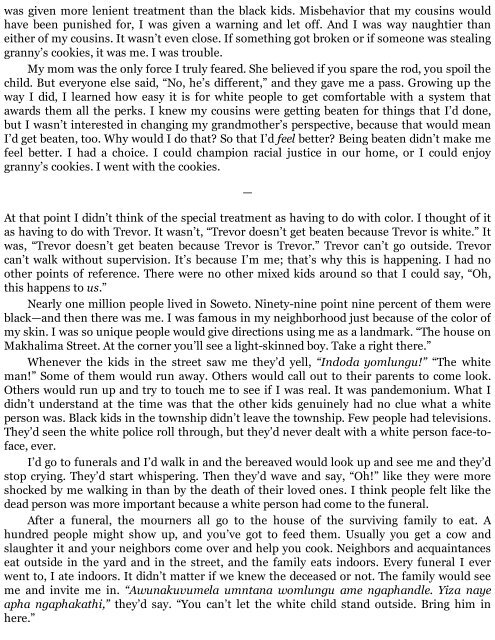Create successful ePaper yourself
Turn your PDF publications into a flip-book with our unique Google optimized e-Paper software.
was given more lenient treatment than the black kids. Misbehavior that my cousins would<br />
have been punished for, I was given a warning and let off. And I was way naughtier than<br />
either of my cousins. It wasn’t even close. If something got broken or if someone was stealing<br />
granny’s cookies, it was me. I was trouble.<br />
My mom was the only force I truly feared. She believed if you spare the rod, you spoil the<br />
child. But everyone else said, “No, he’s different,” and they gave me a pass. Growing up the<br />
way I did, I learned how easy it is for white people to get comfortable with a system that<br />
awards them all the perks. I knew my cousins were getting beaten for things that I’d done,<br />
but I wasn’t interested in changing my grandmother’s perspective, because that would mean<br />
I’d get beaten, too. Why would I do that? So that I’d feel better? Being beaten didn’t make me<br />
feel better. I had a choice. I could champion racial justice in our home, or I could enjoy<br />
granny’s cookies. I went with the cookies.<br />
—<br />
At that point I didn’t think of the special treatment as having to do with color. I thought of it<br />
as having to do with Trevor. It wasn’t, “Trevor doesn’t get beaten because Trevor is white.” It<br />
was, “Trevor doesn’t get beaten because Trevor is Trevor.” Trevor can’t go outside. Trevor<br />
can’t walk without supervision. It’s because I’m me; that’s why this is happening. I had no<br />
other points of reference. There were no other mixed kids around so that I could say, “Oh,<br />
this happens to us.”<br />
Nearly one million people lived in Soweto. Ninety-nine point nine percent of them were<br />
black—and then there was me. I was famous in my neighborhood just because of the color of<br />
my skin. I was so unique people would give directions using me as a landmark. “The house on<br />
Makhalima Street. At the corner you’ll see a light-skinned boy. Take a right there.”<br />
Whenever the kids in the street saw me they’d yell, “Indoda yomlungu!” “The white<br />
man!” Some of them would run away. Others would call out to their parents to come look.<br />
Others would run up and try to touch me to see if I was real. It was pandemonium. What I<br />
didn’t understand at the time was that the other kids genuinely had no clue what a white<br />
person was. Black kids in the township didn’t leave the township. Few people had televisions.<br />
They’d seen the white police roll through, but they’d never dealt with a white person face-toface,<br />
ever.<br />
I’d go to funerals and I’d walk in and the bereaved would look up and see me and they’d<br />
stop crying. They’d start whispering. Then they’d wave and say, “Oh!” like they were more<br />
shocked by me walking in than by the death of their loved ones. I think people felt like the<br />
dead person was more important because a white person had come to the funeral.<br />
After a funeral, the mourners all go to the house of the surviving family to eat. A<br />
hundred people might show up, and you’ve got to feed them. Usually you get a cow and<br />
slaughter it and your neighbors come over and help you cook. Neighbors and acquaintances<br />
eat outside in the yard and in the street, and the family eats indoors. Every funeral I ever<br />
went to, I ate indoors. It didn’t matter if we knew the deceased or not. The family would see<br />
me and invite me in. “Awunakuvumela umntana womlungu ame ngaphandle. Yiza naye<br />
apha ngaphakathi,” they’d say. “You can’t let the white child stand outside. Bring him in<br />
here.”
















